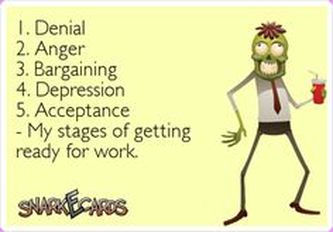|
Maybe I'm just a hyper sensitive as the mom of 3 kids and as a middle school teacher, but lately I have been noticing that my kids, and my students, are really stressed and REALLY anxious.
If I think back to those years, ages 11 - 15 or so, I don't remember feeling really stressed about school. Maybe my mother would say differently, but I don't think I had the same pressures kids have now. I remember carefree afternoons, riding my bike for hours, hanging out with my friends in the tree house, and spending lots of time talking on the phone after school . House phone, of course - the kind with the squiggly line connected to the wall, where if you were lucky, the line stretched far enough so you could sit somewhere a little out of the way. My own kids are hardly the over-scheduled kind. Sometimes they play a sport, but not every season. One is involved in a few after school clubs. The other two are not. They have some chores, but not many. They do their own laundry and keep their rooms neat (in theory). And yet, they are more stressed than I remember being at their age. I see this happening with kids at school as well. There seems to be a high level of anxiety - not all about getting good grades. Some kids are anxious about getting to their lockers on time to then make it to the bus. Others start packing up 5 minutes before class ends because they are anxious about getting to the next place. Some of them, including my own children, are super-anxious about their school work - either getting it done on time, or doing it right, or making sure they get an A. 2 out of my 3 children are very invested in getting good grades, although we don't consciously put pressure on them. We opted them out of state mandated testing last year and will again this year, for the same reasons - high levels of anxiety around testing. Even so, school is a big stressor for them. The anxiety plays out in my students in the form of headaches, stomach aches, twitching faces that look like they may cry any second, and just plain not wanting to go to school. In my day, kids were much more prone to being bullied, ignored, or socially outcast. Our middle school is much more attuned to the social/emotional needs of kids, and is a mostly accepting and diverse place, in every sense of the word. Of course, there is a different kind of pressure for kids today because of the whole online and social media world, which I thankfully didn't have to deal with when I was a teen. The last night of our winter vacation, 2 of our kids were in tears about going back to school (I almost was too, I should add). I tried to get them to think about happy upcoming events; we put lavender oil all over; we did deep breathing; we lit scented candles. Still, the anxiety was palpable and no one got to sleep at a decent hour. That Monday at school, the students were also extra whiny and out of sorts. I think that this anxiety and stress are issues we need to address more in our schools. It probably does not help that educators are also so stressed as well - schools have to take better care of that issue, too.
2 Comments
 Friday before winter vacation: Leave school, excited about the possibilities ahead. You’ll catch up with friends! Read a few books! Clean your basement! Finally organize your closets! Get caught up on your school work! Go to the gym every day! Bring your bags of clothes to Goodwill, wash the car, take a few day trips. Get home, ready to start on your vacation plans. Decide to lie down, just for a little while. Sleep a deep dark sleep for 2 hours and wake up in a total fog. Gather your energy to venture out for take out. After dinner, settle on the couch with your family for a good hour of Netflix. 9PM: Go to bed. Saturday: wake up bright and early, no matter how hard you try to sleep in. Lounge around in your robe for a few hours, nursing your second and third morning coffees. Read more than just the headlines of the newspaper. Sunday: Start tackling some of your household projects. Pause to watch an episode of The Office and have second breakfast. Do some more, then take a nap. Monday: Look in the mirror and notice the bags and shadows under your eyes are disappearing. This will give you a spurt of energy. Continue working on your household projects. Tuesday: Make yourself sleep past 8 AM. Meet some friends for breakfast and take care of a few errands. Take a nap to rest from all that activity. Wednesday: Already halfway through the vacation? Make yourself think “glass half full”: there are still 4 days left after today! You’re going to take full advantage of each day! Thursday: Have a little cry when you realize how quickly time is going.Cram in as many activities as you can that day. Forgo your nap, just for today. Friday morning: Sit down to look at the work you brought home to correct. Then check your Facebook account. Get distracted by cat videos, baby pandas, and checking out pictures of your friends who actually went places for vacation. This is exhausting. Take a nap. Friday afternoon: Actually correct the papers you brought home. Friday night: anxiety starts to creep in….It’s almost over. Sleep restlessly, dreaming about showing up to class without plans, or being very late to school, or being observed by your principal during a class where the students are making a human pyramid and will not listen to you. Saturday: Notice your anxiety is at a 4 out of 5 and steadily growing. You will want to crawl back into bed and binge-watch shows that will take you far away from reality. Give in to that desire. Sunday: the day is long, thankfully. Have a good cry. Then, get over the denial, and come to terms with the end of vacation. Sunday night: plan Monday. March is a brutal month, teachers. Force yourself to think glass half-full again: only 6 weeks until April vacation. Less than 100 days of school until summer. Longer days, warmer weather. Hang in there! Teaching can often feel like this: you are advancing and progressing with your students and then you realize there are huge gaps in their information - even though they can also have surprising funds of knowledge, some days it feels like one step forward and 5 steps back.
Last week, for example, I began a unit on Native Americans, as a preface to a unit on U.S. History. The students began by watching several videos showing how the first Native Americans came to America, including information about Bering Strait Bridge and the Ice Age. I explained things as we went, and took their questions; they were very engaged in the lesson. At the end of the class, I asked students what was still confusing to them. We made a list on the board of questions to answer in the following few days. Questions ranged from, "Why did they have to work so hard back then?" to "How did they get food?" Then, one of my students who comes from the Dominican Republic wrote the question on the board that both made me laugh and hit my forehead at the same time: "How did Colon (Columbus) get to the Dominican Republic if everything was frozen because of the Ice Age?" Ummm......oops. I realized that while my students seemed to be understanding the material, they didn't have a clear timeline in their heads. I didn't think to make that clear for them ahead of time. The next day, I made a giant timeline on the whiteboard, starting with millions of years ago when dinosaurs roamed the earth and ending in 2016. I made sure I marked 1492 on the timeline and pointed it out to the students. Seeing the "0" in the middle of the timeline brought up more questions to answer - confused faces stared up at me when I tried to explain BC and AD. That was an exhausting class. At the same time, it was invigorating. My students kept asking more and more questions and we kept branching off onto tangents. How awesome is that? They wanted to know more. I thought about where these kinds of great lessons fit in with our current emphasis on standardized tests, on models of teaching that do not allow for flexibility, and schedules that take away time on learning for ELL students. Where is the place for them to question and learn about topics that truly engage them, I wanted to keep going and explore those different tangents with my students but I remembered I was already "behind" where I should be. Luckily, I still have more flexibility than other teachers at my school in terms of content we cover and pacing. The next time a moment like that comes up I will do the same: take their questions, investigate online with them, and try to answer their questions. And hope that their curiosity continues to burn within them. |
|

 RSS Feed
RSS Feed
